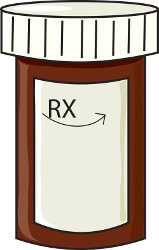Psychostimulants
Facts for Teachers
Psychostimulants, also known as stimulants, are mind-altering drugs that usually speed up the body's functions, such as heart rate.
They are commonly known as "uppers" because they elevate mood and increase energy.
Click Here for Step-by-Step Rules, Stories and Exercises to Practice All English Tenses
However, in children, stimulants have been known to do the exact opposite. In children, stimulants are sometimes used to slow the body down and reduce hyperactivity.
This is why psychostimulants are often prescribed to children labeled with Attention Deficit Hyperactivity Disorder (ADHD).

As a teacher, you see many kids every day. Throughout your teaching, you will probably encounter many children diagnosed with ADHD who are currently taking psychostimulants to reduce unwanted behaviors in the classroom.
You may already be familiar with some of these drugs. Common stimulants used to in cases of ADHD include:
- Adderall

- Concerta
- Dexedrine
- Focalin
- Metadate
- Methylin
- Ritalin
Before giving any advice, it is important for you to know the facts about psychostimulants.
Fact 1: Psychostimulants have many dangerous side effects
In the last few years, many drug companies have issued warnings about side effects of psychostimulants, including:- addiction
- stunted growth

- aggression
- violent behavior
- depression
- hallucinations
- headaches
- suicidal thoughts
- seizures
- insomnia
- heart problems
- liver problems
- vomiting
- mood swings
- weight loss
- psychosis
- stroke
- cardiac arrest
Fact 2:
Psychostimulants are addictive
One side
effect of psychostimulants is addiction. After
some time, the body becomes addicted to the chemicals in the
drug. 
When a person stops taking the drug, the body reacts to the sudden loss of this chemical it has depended on for so long. The results of this dependence include some very disturbing side effects.
Severe
depression and suicide are two alarming side effects of psychostimulant
withdrawal.
Fact 3:
Some psychostimulants are classified as "Schedule II Narcotics"
The U.S.
Drug Enforcement Administration classifies Ritalin, Adderall,
and Dexedrine as schedule
II narcotics (schedule
here means "list"). These drugs are in the same category
as
cocaine, methamphetamines, and opium.
Schedule II narcotics are considered dangerous because they are highly addictive and often abused.
Schedule II narcotics are considered dangerous because they are highly addictive and often abused.
Fact 4: About 2.3 million
teens have abused psychostimulants
Some
people buy and use psychostimulants without a prescription as
"performance enhancements" or to "get high."Amphetamines, such as Adderall, are often abused in these ways.
- speed
- uppers
- crosses
- hearts
- LA turnaround
Fact 5: Psychostimulants are often
a gateway drug to the abuse of other drugs
A "gateway drug" is a drug
that leads to abuse of more dangerous drugs, such as cocaine, heroine,
and methamphetamines.
Studies have shown that teens who use psychostimulants are more likely to abuse other drugs.
Studies have shown that teens who use psychostimulants are more likely to abuse other drugs.

Click here to read more about the effects of psychostimulants:
Psychostimulants: The Facts about the Effects
Get Updates, Special Offers, and English Resources
Download your FREE GIFT (the first two chapters of
English Short Stories Book and Workbook)
as soon as you join!

By submitting your email, you consent to receiving updates and newsletters from us and to the sharing of your personal data with third parties for the purposes of sending you communications. We will not spam you. You can unsubscribe at any time. For more information, please see our privacy policy.
Return from Psychostimulants, Facts for Teachers to How to Teach English






